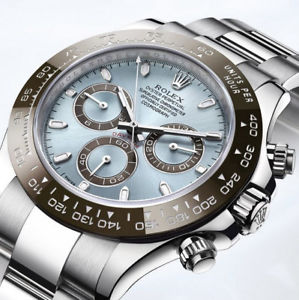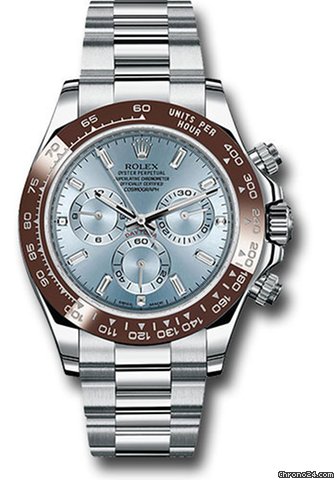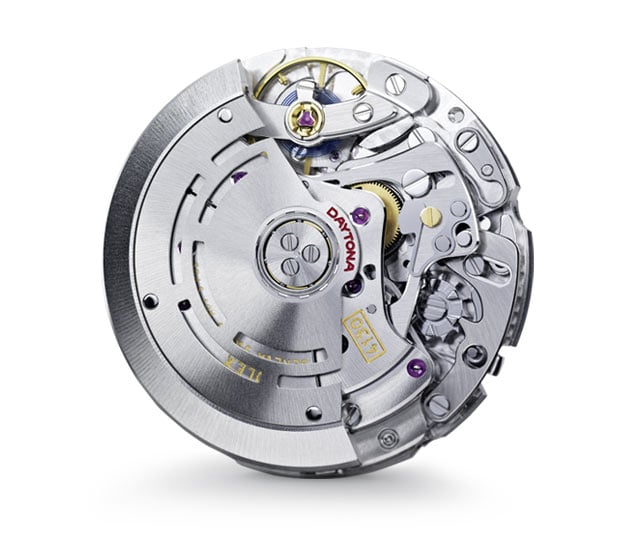Notes: This watch is 40mm 950 platinum case, screw-down crown and push buttons, chestnut brown monobloc Cerachrom bezel with engraved tachymetric scale deposited with platinum via PVD, ice blue dial with 11 baguette diamond hour markers,.
The Rolex calibre 4130 automatic movement, platinum Oyster bracelet, folding Oysterlock buckle with Easylink 5mm comfort extension link.
Mechanism: The Cosmograph Daytona is equipped with calibre 4130, a self-winding mechanical chronograph movement entirely developed and manufactured by Rolex. Its architecture incorporates far fewer components than a standard chronograph, thereby enhancing the movement’s reliability. Like all Rolex Perpetual movements, the 4130 is a certified Swiss chronometer, a designation reserved for high-precision watches that have successfully passed the Swiss Official Chronometer Testing Institute (COSC) tests. The chronograph movement features a Parachrom hairspring, offering greater resistance to shocks and to temperature variations.
By design, the 4130’s vertically coupled approach enables absolutely precise starts and stops of the chronograph seconds hand. When started, stopped, or reset, no unwanted jitters are seen on any of the watch’s hands. The vertical clutch also allows the chronograph to run continuously for extended periods, with no impact on timekeeping accuracy. Understanding Rolex’s longstanding, noble pursuit of maximum timekeeping accuracy, their decision to use a vertical clutch makes sense.
Rolex released the caliber 4130 in 2000. It is completely designed and manufactured by Rolex themselves. It supplants the Zenith El Primero as the movement for the Daytona series of watches. Presumably, the move towards the 4130 was due to the race to become 100% in-house – and possibly issues with servicing the Zenith-made 4030 caliber (for example: less parts).
By design, the 4130’s vertically coupled approach enables absolutely precise starts and stops of the chronograph seconds hand. When started, stopped, or reset, no unwanted jitters are seen on any of the watch’s hands. The vertical clutch also allows the chronograph to run continuously for extended periods, with no impact on timekeeping accuracy. Understanding Rolex’s longstanding, noble pursuit of maximum timekeeping accuracy, their decision to use a vertical clutch makes sense.
Rolex released the caliber 4130 in 2000. It is completely designed and manufactured by Rolex themselves. It supplants the Zenith El Primero as the movement for the Daytona series of watches. Presumably, the move towards the 4130 was due to the race to become 100% in-house – and possibly issues with servicing the Zenith-made 4030 caliber (for example: less parts).
Family Notes: To many collectors, Rolex chronographs are grouped into two categories - Daytonas and "others". And while Rolex has been making chronographs since the 1930s , it wasn't until 1963 that the line of watches was categorized and named - and Daytona wasn't its first name. The original concept for this racing-inspired watch was The Rolex LeMans, and you can even find early advertising copy where the watch you see above - a true Mark I Daytona - is called LeMans. Needless to say, the name didn't stick, as Rolex's push into the American market and into official sponsorship of the 24 hour race at Daytona led to the naming of the reference 6239 Cosmograph as the Daytona. That didn't happen until 1964, and the watch in question here was produced in 1963, but we'll still call it a Daytona because it launched the reference, and thus the entire Daytona line.
From 1963 - 1988 Daytonas were Valjoux-sourced manual wind calibers; From 1988 - 2000 Rolex used a modified Zenith El Primero (Cal. 400). The Rolex version of this movement is called the caliber 4030. From 2000 to present the fully in-house, Rolex designed and manufactured automatic caliber 4130.
The bezel on this watch is distinctive. The numerals are all aligned so that they remain upright all the way around the dial, which is the old school look. A small design element common to all Daytona Cosmographs is sub dials that in some way contrast the dial.
From 1963 - 1988 Daytonas were Valjoux-sourced manual wind calibers; From 1988 - 2000 Rolex used a modified Zenith El Primero (Cal. 400). The Rolex version of this movement is called the caliber 4030. From 2000 to present the fully in-house, Rolex designed and manufactured automatic caliber 4130.
The bezel on this watch is distinctive. The numerals are all aligned so that they remain upright all the way around the dial, which is the old school look. A small design element common to all Daytona Cosmographs is sub dials that in some way contrast the dial.
Item created by: gdm on 2018-10-15 20:59:04. Last edited by gdm on 2018-10-15 21:00:33
If you see errors or missing data in this entry, please feel free to log in and edit it. Anyone with a Gmail account can log in instantly.
If you see errors or missing data in this entry, please feel free to log in and edit it. Anyone with a Gmail account can log in instantly.




